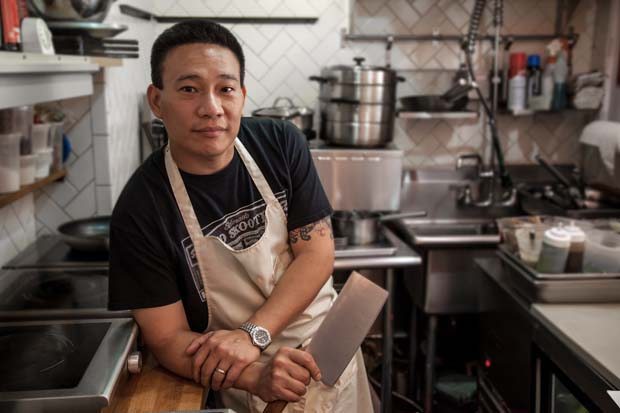
after a distinguished stretch in the Manhattan restaurant scene and appearances on prime-time coo king shows, chef Chris Cheung turns to Brooklyn, and revamps the Chinese culinary profile with his East Wind Snack Shop
by amanda mccoy • photos by Leslie Brienza
When culinary heavyweight Chris Cheung celebrated the grand opening of his Chinese eatery East Wind Snack Shop, he was immediately greeted with rave reviews from the press and customers alike. After a fruitful career in the high profile Manhattan restaurant scene (with a résumé touting distinguished city hotspots like Nobu and Jean-Gorges) and accolades such as “A New York Legend” and “One of the top Asian chefs in America,” it’s small surprise his handmade dumplings and crisp spring rolls are such a smashing hit.
So, where can you find this refreshing blend of traditional flavor and modern technique, plus some of the fluffiest bao you can find in all five boroughs? Not on the buzzing streets of the South Slope or Williamsburg, nor did the Chinatown native opt to join the trending industrial style bistros of Gowanus. Instead, the quiet neighborhood of Windsor Terrace is host to this unexpected gem, on a treelined street just off the F train.
The unlikely choice of location may have perplexed a few initially, especially given the volatile nature of this particular address. 471 16th Street has witnessed a series of blips over the last few years, briefly serving as an oyster bar, then mom and pop potato shop, with its longest run in recent memory as an ice cream parlor. But a neighborhood starved for fresh cuisine options has wholly welcomed this addition to the area’s slowly-growing restaurant repertoire.
Cheung smiled when asked about the location.
“There were these small coffee shops in Chinatown where people would stop to grab a bite to eat then go back to work. When you’re working really hard, dead broke, and trying to feed your family, one of the things you enjoy in life is good food. That’s what those little coffee shops did for people, and that’s what we’ve emulated here. People come by, eat good food, and go back to their daily lives. Kids and their parents stop in, have a great time, and make memories. Those things are important, especially for the neighborhood.”
If the goal is to offer an eclectic fusion of traditional Chinese flavor blended with urban panache, it’s not only the menu that’s succeeded. The space isn’t much bigger than a typical downtown studio, with limited seating and a long countertop reminiscent of the Chinatown coffee houses of the ’70s. The walls are adorned with traditional Chinese décor offset by a large chalkboard reading “Will the Mets take it all!?” (Apologies for the painful association) and a Pink Floyd guitar solo coursing through the aural background. The open kitchen space is small at best, too, but it’s an oasis for the sole chef, who whips up more than 1,000 dumplings per day.
Even with the aesthetic charm, the menu is what makes this place truly special. Wonderfully simple (the chef laughs about the early days when he idealistically offered 20 different dishes), patrons can choose from nine small plates, including 28-day aged dry beef folded inside a house-made potsticker shell, juicy fork-tender sweet chili ribs that literally fall apart in your mouth, and Cheung’s signature pork belly gwaco bao, with the spry dough made from scratch daily (the owner’s mantra is, “Fresher is fluffier, and fluffier is better”).
Other fan favorites are the Happy Buddha Vegetables with fermented tofu seasoning and jasmine rice, foie gras bao, and the wondrous vegetable spring rolls topped with house recipe seasoning salt—the chef happily giving his wife and her family credit for the last one.
“My wife is from Shenjiamen,” he said. “Where they’re known for their spring rolls. That’s what inspired this original recipe. I was determined to do them justice.”
His wife’s heritage gave him much more than merely a succulent appetizer. After notable success in other Eastern culinary genres such as Japanese and Thai, Cheung made the decision to get back to his roots and dedicate himself to the ever evolving art of Chinese cuisine for the North American audience. This commitment led him directly to Shenjiamen to study the region’s ancient cooking traditions, where he picked his own produce and procured his own meat (with no ingredient ever seeing the inside of a refrigerator). He then, and much to this borough’s delight, brought these back-to the-basics practices here.
“Good food is good in any neighborhood,” the owner added with a smile. “That’s what this place is. It’s simple—just damn good Chinese food.”




